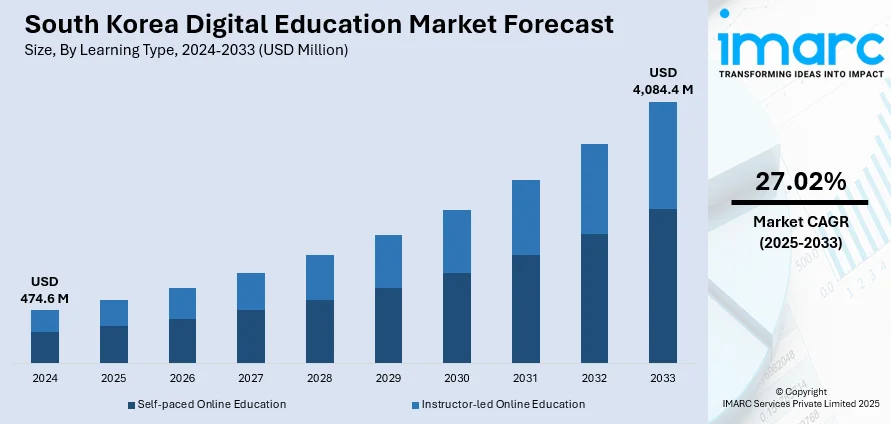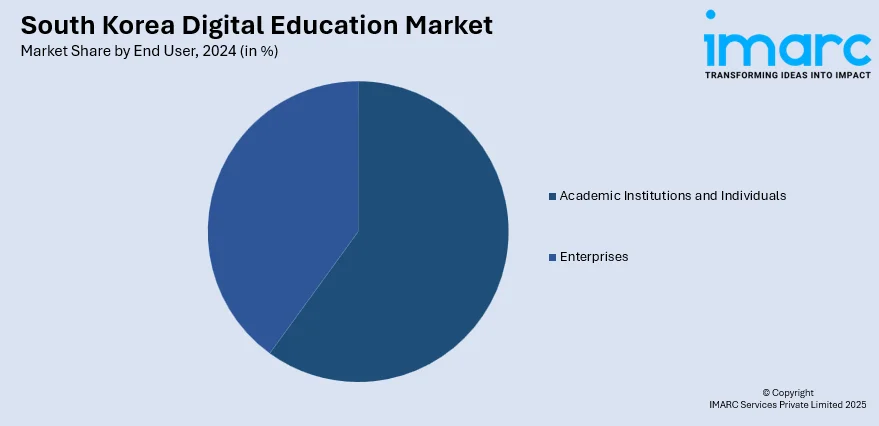
South Korea Digital Education Market Size, Share, Trends and Forecast by Learning Type, Course Type, End User, and Region, 2025-2033
South Korea Digital Education Market Overview:
The South Korea digital education market size reached USD 474.6 Million in 2024. The market is projected to reach USD 4,084.4 Million by 2033, exhibiting a growth rate (CAGR) of 27.02% during 2025-2033. The market is growing due to increased adoption of e-learning platforms and AI-based educational tools. In addition, strong focus on personalized learning and digital classroom infrastructure continues to support South Korea digital education market share across academic institutions, corporate training programs, and language learning platforms.
|
Report Attribute
|
Key Statistics
|
|---|---|
|
Base Year
|
2024
|
|
Forecast Years
|
2025-2033
|
|
Historical Years
|
2019-2024
|
| Market Size in 2024 | USD 474.6 Million |
| Market Forecast in 2033 | USD 4,084.4 Million |
| Market Growth Rate 2025-2033 | 27.02% |
South Korea Digital Education Market Trends:
Technology Integration in Classrooms Expands
Schools and universities are increasingly turning to digital tools to improve how lessons are delivered and managed. Smart classrooms, equipped with interactive displays and digital whiteboards, are becoming more common across South Korea, replacing older teaching methods. This change supports personalized learning, allowing students to learn at their own pace using tablets, apps, and cloud-based platforms. The shift is not only improving student engagement but also helping teachers track progress in real-time. This momentum is a major factor behind South Korea digital education market growth, as both public and private sectors continue to invest in infrastructure upgrades. In 2024, several school districts partnered with edtech companies to roll out AI-driven learning platforms in core subjects. These platforms can assess performance instantly and suggest additional practice tasks or video explanations. The focus on technology-supported learning is also seen in special education and after-school programs, with platforms offering tailored content for diverse learning needs. Such initiatives are encouraging a broader shift toward digital-first education planning and budget allocation, signaling continued growth across various academic levels and training sectors in the country.

To get more information on this market, Request Sample
E-Learning Platforms See Higher Usage
Students, parents, and professionals are increasingly choosing flexible e-learning options over traditional education formats. This shift is reshaping how learning is accessed, especially in urban areas where time and convenience are critical factors. Remote education, once seen as a temporary solution, has now become a preferred choice for exam preparation, skill development, and language learning. Strong internet infrastructure and high smartphone usage across South Korea have enabled this change. The availability of live sessions, recorded classes, and gamified content is attracting a wide range of learners. Corporate training is also adopting e-learning, with companies using online modules for employee onboarding and professional development. These factors are shaping current South Korea digital education market trends, especially as more providers focus on mobile-first platforms and AI-backed course recommendations. In 2024, a major university launched a digital campus offering fully online degree programs, supported by virtual labs and cloud-based collaboration tools. Edtech startups are also gaining momentum, launching subscription-based models with bite-sized lessons to appeal to younger learners. As competition grows, platforms are refining their features to provide better outcomes, usability, and personalized paths, reinforcing the country’s position as a leading player in the digital education space.
South Korea Digital Education Market Segmentation:
IMARC Group provides an analysis of the key trends in each segment of the market, along with forecasts at the country and regional level for 2025-2033. Our report has categorized the market based on learning type, course type, and end user.
Learning Type Insights:
- Self-paced Online Education
- Instructor-led Online Education
The report has provided a detailed breakup and analysis of the market based on the learning type. This includes self-paced online education and instructor-led online education.
Course Type Insights:
- Science, Technology, Engineering, and Mathematics (STEM)
- Business Management
- Others
The report has provided a detailed breakup and analysis of the market based on the course type. This includes science, technology, engineering, and mathematics (STEM), business management, and others.
End User Insights:

- Academic Institutions and Individuals
- Enterprises
The report has provided a detailed breakup and analysis of the market based on the end user. This includes academic institutions and individuals and enterprises.
Regional Insights:
- Seoul Capital Area
- Yeongnam (Southeastern Region)
- Honam (Southwestern Region)
- Hoseo (Central Region)
- Others
The report has also provided a comprehensive analysis of all the major regional markets, which include Seoul Capital Area, Yeongnam (Southeastern Region), Honam (Southwestern Region), Hoseo (Central Region), and others.
Competitive Landscape:
The market research report has also provided a comprehensive analysis of the competitive landscape. Competitive analysis such as market structure, key player positioning, top winning strategies, competitive dashboard, and company evaluation quadrant has been covered in the report. Also, detailed profiles of all major companies have been provided.
South Korea Digital Education Market News:
- October 2024: South Korea launched the "AI-Digital (AID) 30+ Project," investing 110 Billion Won to enhance digital education for adults over 30. This initiative, which includes 100 AI and digital-leading universities and digital training programs, significantly impacted the digital education market by expanding lifelong learning opportunities.
South Korea Digital Education Market Report Coverage:
| Report Features | Details |
|---|---|
| Base Year of the Analysis | 2024 |
| Historical Period | 2019-2024 |
| Forecast Period | 2025-2033 |
| Units | Million USD |
| Scope of the Report |
Exploration of Historical Trends and Market Outlook, Industry Catalysts and Challenges, Segment-Wise Historical and Future Market Assessment:
|
| Learning Types Covered | Self-paced Online Education, Instructor-led Online Education |
| Course Types Covered | Science, Technology, Engineering, and Mathematics (STEM), Business Management, Others |
| End Users Covered | Academic Institutions and Individuals, Enterprises |
| Regions Covered | Seoul Capital Area, Yeongnam (Southeastern Region), Honam (Southwestern Region), Hoseo (Central Region), Others |
| Customization Scope | 10% Free Customization |
| Post-Sale Analyst Support | 10-12 Weeks |
| Delivery Format | PDF and Excel through Email (We can also provide the editable version of the report in PPT/Word format on special request) |
Key Questions Answered in This Report:
- How has the South Korea digital education market performed so far and how will it perform in the coming years?
- What is the breakup of the South Korea digital education market on the basis of learning type?
- What is the breakup of the South Korea digital education market on the basis of course type?
- What is the breakup of the South Korea digital education market on the basis of end user?
- What is the breakup of the South Korea digital education market on the basis of region?
- What are the various stages in the value chain of the South Korea digital education market?
- What are the key driving factors and challenges in the South Korea digital education market?
- What is the structure of the South Korea digital education market and who are the key players?
- What is the degree of competition in the South Korea digital education market?
Key Benefits for Stakeholders:
- IMARC’s industry report offers a comprehensive quantitative analysis of various market segments, historical and current market trends, market forecasts, and dynamics of the South Korea digital education market from 2019-2033.
- The research report provides the latest information on the market drivers, challenges, and opportunities in the South Korea digital education market.
- Porter's Five Forces analysis assists stakeholders in assessing the impact of new entrants, competitive rivalry, supplier power, buyer power, and the threat of substitution. It helps stakeholders to analyze the level of competition within the South Korea digital education industry and its attractiveness.
- Competitive landscape allows stakeholders to understand their competitive learning type and provides an insight into the current positions of key players in the market.
Need more help?
- Speak to our experienced analysts for insights on the current market scenarios.
- Include additional segments and countries to customize the report as per your requirement.
- Gain an unparalleled competitive advantage in your domain by understanding how to utilize the report and positively impacting your operations and revenue.
- For further assistance, please connect with our analysts.
 Request Customization
Request Customization
 Speak to an Analyst
Speak to an Analyst
 Request Brochure
Request Brochure
 Inquire Before Buying
Inquire Before Buying




.webp)




.webp)












